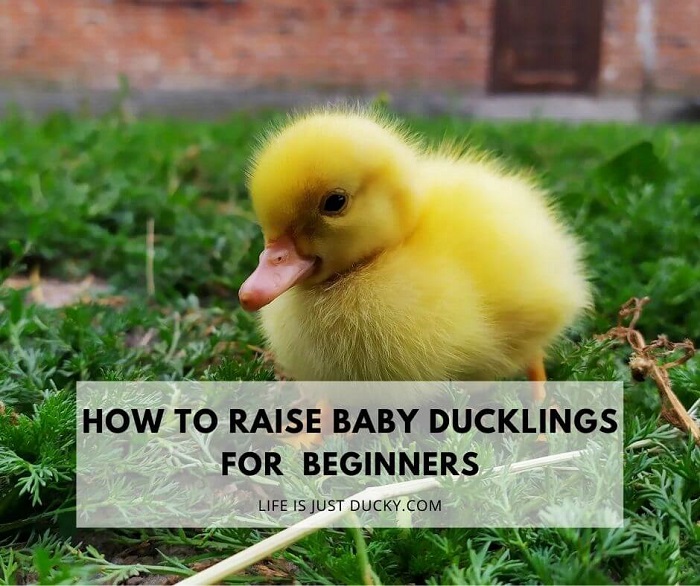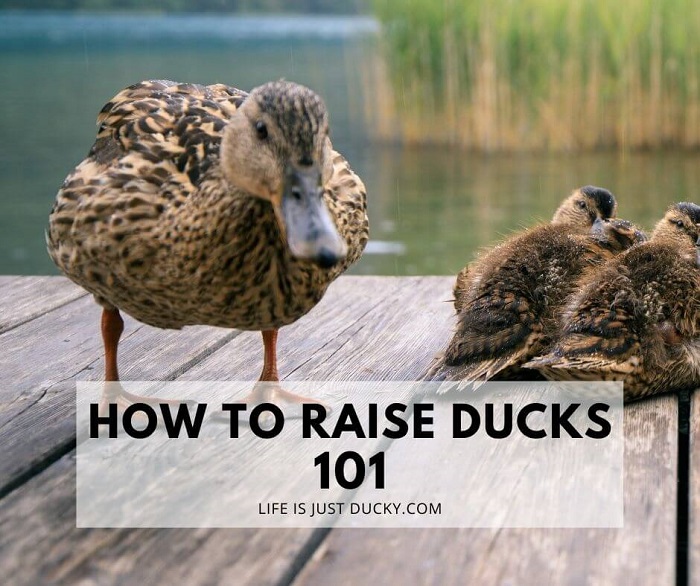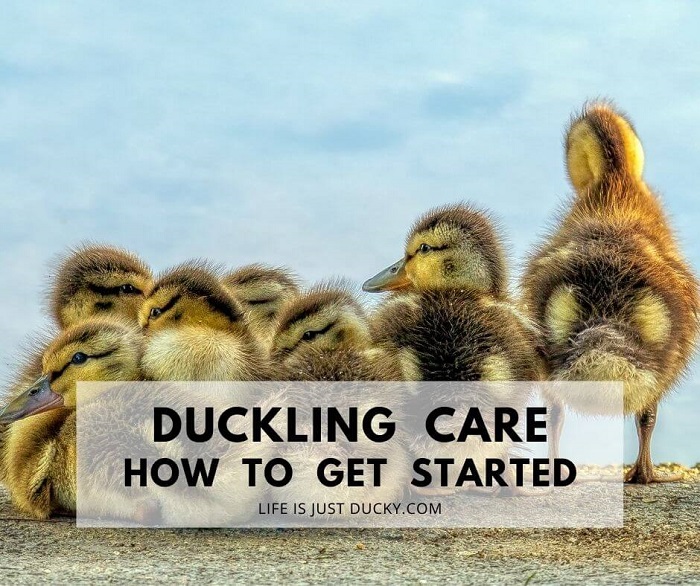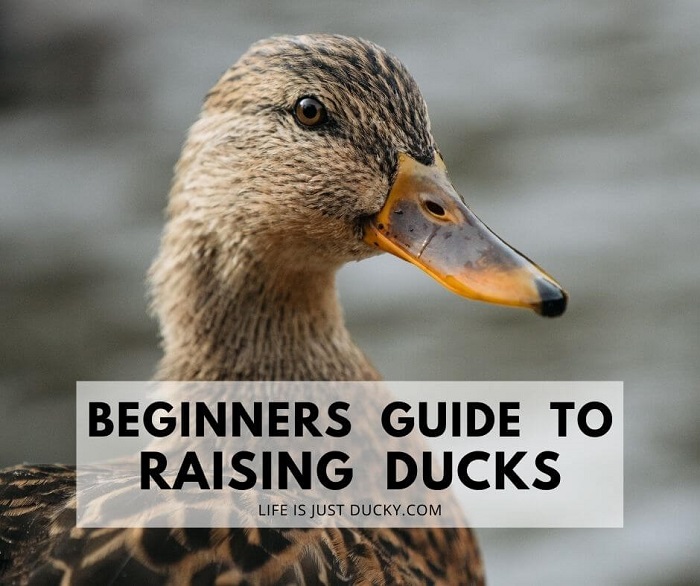How Often Do You Feed Baby Ducklings





Raising ducks can be a joy and a challenge. It can also be very rewarding as ducks can be one of the most versatile and useful animals on a homestead, however large your homestead happens to be.
Besides providing eggs, there are so many other ways ducks help on your homestead. From the bug patrol to the cuteness factor of ducklings. But there are a few things you need to know before you bring home those bundles of fluff.
Duckling Care.
How do you take care of baby ducklings? What do they need? What do they eat, Can you keep just one? How do you keep them warm? How warm do they need to be?
There is a lot to learn about what ducklings need.
These are just a few of the questions you will be asking when you first bring home those adorable little quackers.

First written May 5, 2015 – Updated March 3, 2022
This post may contain affiliate links. Please read my disclosure if you have questions.
Thank you for supporting this site with purchases made through links in this post. Here's My Amazon Link
If you have found a baby duck abandoned, Read this first.
Check Town Ordinances Before Raising Ducks.
Can you keep ducks in your backyard?
Before you bring that bundle of fluff home and get attached and before you start buying the stuff you need to keep your ducklings safe and happy, check the law. There are unfortunately a lot of towns, counties, and cities that do not allow keeping chickens and ducks.
It is just terrible to fall in love with your new flock, just to find out you will have to find them a new home.
Related>> How Long Do Ducks Live? How To Extend Their Life.
Why Do You Want To Raise Ducks?
Do you want ducks for the long hall? Please think about this before you get them.
The worst reason in the world to get ducks is because you see how cute they are in the store at Easter time. (trust me, that stage passes very quickly)
Getting any animal should not be an impulse buy. Think it through and make sure it is a commitment you want to make. Here are a couple of articles to help you make that decision. Then read on. We will get you ready for your new friends.
Related: 10 Reasons NOT To Raise Ducks.
Related: 10 Reasons TO Raise Ducks.
Do You Have The Time?
Keeping any animal takes time. Time to feed and water it, time to clean up after them. Make sure before you bring them home you will have that time to take care of them. Remember also, it's not as easy to find a duck sitter so you can go on vacation as it is to find one for your dog or cat. And this is not a short time commitment. Ducks generally live 7 – 15 years or more.

Related: How And Where To Buy Baby Ducks.
Basic Duckling Care
But then again, when you have ducks dropped in your lap you are in for a crash course about how to take care of your little bundles of fluff. It's been several years since that happened to me, but that experience and all the years since allows me to help you get started with your ducklings.
Ducklings are so cute ! But it is kind of like bringing home your first baby. "Now what do I do?" That's where I was several years ago.
A friend of my daughters called her up one Saturday morning frantic. A mother duck had been hit by a car in front of her house, and huddled in front of her garage were 8 brand new ducklings.
They tried to find a refuge that would take them, to no avail. So the next thing I knew my daughter was calling me to ask "Mom, can I keep them?" (Yes she actually said that)
So my daughter brought them home to raise. When you bring home a baby like that, you have to learn a lot really fast . And so the adventure began. So, in case this happens to you, (or you do it on purpose) I've written this so you will know what to do.
Duckling Care – What Do Ducklings Need?
One of the biggest mistakes people make when getting ducks is not having their "ducks in a row" before they bring their ducklings home.
You want to have their housing, feeders, waterers, food, and everything else you need BEFORE you bring home your ducks.
Related: A Well Designed Duck Coop To Make Your Life Easier.
Duckling Care – Ducklings Need Water.
The most important factor in raising ducks is water. Water is a must for ducks.
They have to keep their nasal cavities moist. Water also needs to be near their food, as they can choke on the food so they need to have water to wash it down.
Related: How To Get Clean Water For My Ducks.
Ducks also need a lot to drink each day. Quite a bit more than chickens.
And that is before they play in it. Ducks love to play in their water. They make messes with water. They bathe in their drinking water. Yes, it should come as no surprise that ducks like water.
The water for ducklings should be deep enough that they can submerge their whole bill in it. Just make sure if you give ducklings water to swim in, they can get back out.
Adult ducks also need to submerge their bills when they eat, and they get the water really dirty. That's why we put in a special, easy to clean waterer. It cut my water cleaning time way down.
Way in the future, when my momma duck had a batch of young ones I had a small dish for the ducklings to bathe in, but I made sure the large duck water trough had bricks in it, so if a duckling got in, it could get back out. (and don't underestimate how high a duckling can jump!)
Please be aware. For the first few weeks, ducklings have not yet begun to produce the oil that makes them "waterproof" that helps them float. So even though they love the water, when they are very young they can still drown. Drowning is a major cause of duckling deaths.
Related: Do Ducks Need A Pond?
Day Old Ducks!
What Should You Feed Ducklings?
Getting food for your ducklings is pretty easy. They can eat when first hatched. They should be provided starter waterfowl feed or, if you need it fast and your feed store doesn't carry it, (and most of them don't) you can feed them starter chick feed, with a couple of caveats.
First – Make sure it is NOT MEDICATED. Chickens get a respiratory disease that ducks do not get. So ducks don't need the medication they put in chick feed. Ducklings also eat more than chicks, so they can get too much medicine and overdose.
Second – Ducklings need more niacin than chickens so they can grow strong bones, So you will need to supplement the chick feed. You can buy Brewer's Yeast to add to their food and that will do the trick. It's also good to introduce them to vegetables right away. Small amounts of chopped up greens and herbs floating in a saucer of water is both nutritious and fun for the ducklings. They are more likely to eat a varied diet later in life if introduced to it when they are younger.
Related: What To Feed Ducklings.
Related: What To Feed Ducks In Your Backyard.
Temperature is also very important.
Mother ducks will naturally keep their ducklings warm, but if you don't have a mother duck then you need to make sure your ducks are warm enough.
How do you do that? You can put a heat lamp or a heat plate at one end of the brooder. That way if they are cold they can get under the heat, and if they get too warm they can move to the other end and get away from it.
A heat plate may be more expensive and not as readily available (you might have to order it online), but it is much safer. Heat lamps have been known to catch things on fire.
Ducklings need to be started from the first day at 90°F for the first week and the temperature should be decreased by about 1 degree a day after that until they are acclimated to the outside nighttime air temperature and are fully feathered out.
When I got those first ducklings, I was told I needed a heat lamp. When I saw them huddled at the far end of the brooder I took a thermometer and measured the temperature under the lamp and it was 120°F (48.8° C)!!
I wasn't told to check the temperature. So don't take the instruction that you "need a heat lamp" at face value. If the ducklings are huddled under the warmer it might not be warm enough and if they can't get far enough away from it. It may be too warm. Use a thermometer and check to be sure.
Related: 30 Gift Ideas For Duck Lovers

Related: Setting Up A Brooder Box For Baby Ducks.
Raising Baby Ducklings – More Needs
Make sure what they are standing on is not slippery. A slick surface is much easier to clean but it can be very detrimental to your ducklings. If their floor is slippery it will hurt their delicate growing bodies. They can get a condition called splay leg and will need to be treated for this. Just avoid that altogether by making sure they have a non-skid surface to stand on.
Towels that can be washed or pine shavings work fine. (don't use cedar shavings) Paper towels would probably work well too, but you will need to use a lot of them.
Ducks, like all fowl, are messy and dirty. Their bedding will need at least daily cleaning. They poop everywhere. (even in their water dish) and they spread the water, from any source, all over! Don't expect a nice neat duckling. They may be clean birds (bathe themselves) but they are messy! In fact, this is the number 1 complaint most people have about raising ducks.
If you don't have a momma duck, put a washable stuffed animal in the brooder with the ducklings so they have something to cuddle up with. They will be so much more secure.
Ducks Need Company
Ducks are social creatures. In the wild there is safety in numbers, they don't like to be alone. If you buy ducks, make sure you get at least 3. They will be so much happier.
I got to be known as the 'duck rescuer'. When someone found an abandoned ducking, they brought it to me.
Once a single duckling was found in a parking lot. They searched around for the mother or any sibling and none were found. So here I was with one lone duckling. The little guy cried non-stop. When my daughter said he was singing a solo, the name stuck and he became "Solo". which evolved into "Han Solo". (yeah, we're that family).
I knew my little singer needed a buddy so the next day we went down to the feed store and amongst the chicks was the last duckling they had. When we put her in with Solo, he calmed right down. All was right with the world because he had a buddy.
She became "Chewbacca" or "Chewy" for short. It's many years later and Chewy is still laying eggs for us today.
How To Handle Ducks.
When approaching a duck, try not to chase them. Chasing is going to stress them out and will likely make them skittish around you. Lowering yourself down to their level and offering a little bit of food will encourage your duck to want to come up to you.
If you can't get them to come up to you, gently corral the duck into a corner before you attempt to pick them up. When you are near enough, you can place one hand on each side of their body, keeping their wings against them. You can then lift them towards you so that one side is held firmly against your body.
Never grab them by the foot or leg. This is a duck's weak spot, and a leg can easily be broken.

Related: Deep Litter Duck And Chicken Run.
Ducks Need Shelter
The Coop – When It's time to take them out of the brooder you will have to provide your ducks with shelter. Even though ducks like water, they do need shelter from the rain and wind. They need a clean and dry place to bed down. No one, not even a duck, wants to be wet and cold all the time.
Related: 10 Necessities To A Perfect Duck House.
Plan on, at the very minimum, 3 sq ft per bird in the coop. PLUS they need a spacious run if they are not free-ranged. It needs to be secure and clean. Consider a deep litter for the floor of the coop. That is the best option I have found.
Your coop needs to be well ventilated, as moisture build-up, ammonia from their waste, and dust, all can cause problems for your birds. Even when it is cold they need fresh air.
Where there are ducks (or chickens for that matter) there will be flies. The deep litter method helps a lot. But if that is not enough, consider using fly predators. They are tiny, non-stinging wasps that kill fly larva. They are the best thing I have found for controlling flies in my coops and yards.
Related: How To Get Rid Of Flies In Your Chicken Coop, Naturally!
There are a few things about a duck coop that needs to be different from a chicken coop. A duck doesn't roost. They will bed down on the floor. Ducks also nest (lay eggs) on the floor so the fancy nesting boxes are not necessary and probably too small anyway. Here is an option I found that my ducks liked and helped keep the duck eggs a little cleaner.
The ramp to most chicken coops is often too steep for those big feet. If you already have an elevated coop, do your ducks a favor and extend the ramp so the ducks don't struggle to get in at night. Better yet, build a coop at ground level.
Related>> Caring For Ducks In Winter, What You Need To Know.
Duckling Care – Are your Ducks Safe?
Security – This is something that is often overlooked. But think about this for a minute. EVERYTHING loves to eat ducks and chickens. So you have to do your due diligence to make sure your babies are secure.
I thought my first ducks were secure but I really underestimated a hungry predator. It taught me a valuable lesson that I hope you don't have to go through.
An automatic coop door is not essential, but it will let you sleep in on Saturday morning and still keep your ducks safe at night. That's really something to consider. My daughter got one for Christmas this last year. She was SO excited for that very reason.
Related: Preparing For Predators On The Homestead.
Raising Ducks – What Is Molting?
If you come out one morning and there are feathers all over, but you do a headcount and all your precious flock is still there, then the culprit is molting.
What is molting? After a whole year, a duck's feathers will have taken a real beating. In order for them to keep them warm through the winter, they need to get new ones. So in the fall, a duck will lose their feathers and grow new ones. This process is called molting. It helps to feed them a higher protein diet during this time because it takes a lot out of a duck to make all those new feathers.
Related: What Is Molting And What Can You Do To Help Your Birds?

What To Feed Your Adult Birds?
Ducks are a hardy bird and generally stay very healthy, but good nutrition helps them stay that way.
If you want healthy birds and healthy eggs, then you want to feed them right. But what can they eat? With the exception of needing extra niacin (brewers yeast) and not giving them medicated feed, they can eat the same as you would feed chickens.
Related: What To Feed Ducks In Your Backyard
Raising Ducks For Eggs.
One of the best reasons to raise ducks is for those yummy, good for you eggs. Ducks lay a lot of them every year. Some breeds will even surpass chickens in the number of eggs they lay. Choosing the right breed will ensure you get the most production. Good care and nutrition will increase the number too.
You can also let your ducks hatch new ducklings, to increase your flock, sell for profit, or for meat. Having ducklings running around your pen is such a fun thing to do.
Related: Duck Eggs Vs Chicken Eggs. Why Duck Eggs Are Better.
Why Raise Ducks?
So why would you choose to raise ducks?
- These amazing creatures don't need acres of land. They can be raised in your own backyard.
- Many are not as loud as chickens and can produce as many if not more eggs.
- If you already have chickens, ducks (especially the females) can coexist quite well with them.
- They can also be a good source of meat.
- Ducks are hardier than chickens and can take less than ideal weather much better than chickens.
- You are very unlikely to lose a duck to disease and they have very little problem with mites and parasites.
- Ducks are much less likely to get frostbite in the winter and can cool themselves off in a pond in the summer. In fact, my sister-in-law used to break the ice on their pond during the winter so her ducks could take a swim. (burr) But they loved it.
- But where ducks really shine is in bug patrol. It has been said that if you have a snail or slug problem in your garden, what you really have is a lack of ducks.
They are also great at ridding a yard or garden of Japanese beetles and grubs of all kinds. At the end of the gardening season, let your ducks wander through your garden and clean up all the spent plants and bugs and you will have a head start on your pest control for the next growing season.
Related: Control Bugs In Your Garden. Naturally!
Final Thoughts On Raising Ducklings.
Raising ducks is an experience I wouldn't have traded for anything in the world. I've had joys and sorrows and lots of delicious eggs. I hope your experience is as wonderful as mine has been.
Want to learn more about raising ducks? Here are my favorites.
Duck Eggs Daily
Storey's Guide To Raising Ducks
And The Essentials.
Waterproof Boots
Don't forget the Brewers Yeast
Did you like this post? Then, I'd love it if you'd share it!
Want some more top posts? Check out this list of Readers Favorites.
Happy Backyard Homesteading!

I believe everyone can grow at least part of their own food! Let me show you how.
Save
Save
Save
williamsmucatinter.blogspot.com
Source: https://www.lifeisjustducky.com/raising-ducks-101/
Post a Comment for "How Often Do You Feed Baby Ducklings"